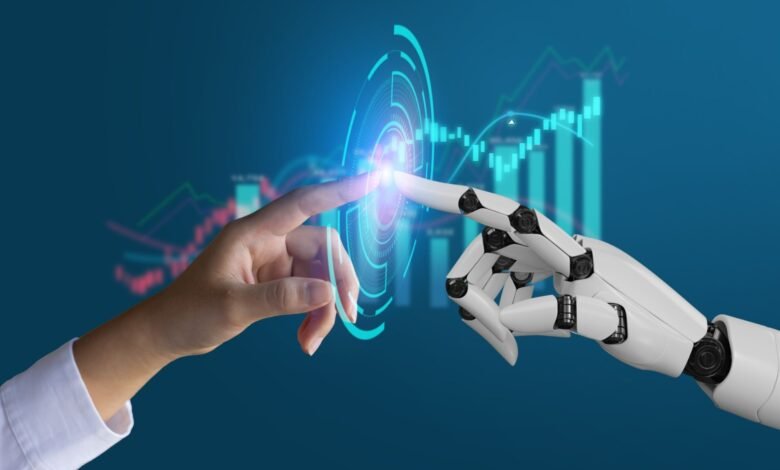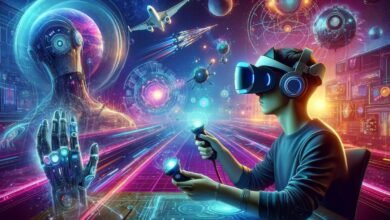The Future of Artificial Intelligence: Trends and Innovations

Artificial Intelligence (AI) has become one of the most transformative technologies of our time, influencing industries, reshaping economies, and redefining how humans interact with machines. As AI evolves, its potential to revolutionize sectors like healthcare, transportation, finance, and education continues to grow. The future of AI promises innovations that will enhance human lives, tackle global challenges, and push the boundaries of what machines can achieve.
What is Artificial Intelligence?
Artificial Intelligence refers to the development of computer systems capable of performing tasks that typically require human intelligence. These tasks include decision-making, speech recognition, visual perception, and language translation.
AI operates through various techniques and paradigms, such as:
- Machine Learning (ML): Algorithms learn patterns from data to make predictions or decisions.
- Deep Learning: A subset of ML that uses neural networks to mimic the human brain for complex problem-solving.
- Natural Language Processing (NLP): Enables machines to understand and generate human language.
- Computer Vision: Allows AI to interpret visual data, such as images and videos.
Trends Shaping the Future of AI
1. Generative AI
Generative AI, powered by advanced models like GPT and DALL-E, is redefining creativity. These tools can generate text, images, videos, and music, opening new possibilities in content creation, design, and storytelling.
Applications include:
- Personalized Marketing: Crafting unique ads and content for individual consumers.
- Entertainment: Creating realistic virtual characters and environments for movies and games.
- Education: Developing interactive and customized learning materials.
2. AI in Healthcare
AI is revolutionizing healthcare by enhancing diagnosis, treatment, and patient care.
Key innovations:
- Predictive Analytics: Using AI to predict disease outbreaks and individual health risks.
- Drug Discovery: Accelerating the development of new medicines by analyzing molecular data.
- Robotic Surgery: Enhancing precision and reducing recovery times with AI-powered surgical robots.
3. Autonomous Vehicles
Self-driving cars, powered by AI, are set to transform transportation. These vehicles rely on computer vision, sensor fusion, and decision-making algorithms to navigate roads safely.
Future prospects:
- Public Transportation: Autonomous buses and shuttles for urban areas.
- Logistics: Driverless trucks for efficient goods delivery.
- Smart Traffic Management: AI-integrated systems to reduce congestion and optimize routes.
4. AI and the Internet of Things (IoT)
AI combined with IoT is enabling smarter homes, cities, and industries. AI processes data collected by IoT devices to make real-time decisions.
Examples:
- Smart Cities: AI-powered systems for energy optimization, traffic control, and waste management.
- Industry 4.0: AI-driven automation in manufacturing for increased productivity.
- Connected Homes: AI managing household devices like thermostats, security cameras, and appliances.
5. Ethical and Responsible AI
As AI becomes more pervasive, ethical considerations are gaining prominence. Governments, companies, and researchers are focusing on creating transparent, fair, and unbiased AI systems.
Challenges include:
- Bias Mitigation: Ensuring AI systems do not perpetuate societal inequalities.
- Data Privacy: Balancing innovation with the need to protect personal information.
- Regulation: Establishing global standards for AI governance.
Innovations Driving AI Forward
1. Edge AI
Edge AI involves running AI algorithms locally on devices rather than relying on centralized data centers. This reduces latency, enhances privacy, and enables real-time processing.
Examples:
- Smartphones: AI-powered cameras and voice assistants.
- Wearables: Fitness trackers analyzing health data in real time.
- Drones: Autonomous navigation for delivery and surveillance.
2. Explainable AI (XAI)
Explainable AI aims to make AI systems transparent and understandable to humans. By explaining how decisions are made, XAI fosters trust in critical areas like healthcare, law enforcement, and finance.
3. AI and Quantum Computing
Quantum computing, combined with AI, could solve complex problems faster than traditional systems. This synergy holds promise for drug discovery, financial modeling, and climate simulation.
The Impact of AI on the Workforce
AI is transforming the workplace, automating repetitive tasks and enabling workers to focus on strategic and creative roles.
- Upskilling Opportunities: The demand for AI skills is driving the need for reskilling programs in data science, coding, and AI ethics.
- New Job Roles: AI is creating roles like AI trainers, ethicists, and data analysts.
- Collaboration with Humans: AI enhances human capabilities rather than replacing them entirely.
Challenges in AI Development
Despite its potential, AI faces significant hurdles:
- Energy Consumption: Training large AI models requires vast computational resources.
- Algorithmic Bias: Ensuring fairness and inclusivity in AI systems is a critical challenge.
- Ethical Dilemmas: Addressing concerns about surveillance, data misuse, and autonomous weapons.
The Road Ahead for AI
The future of AI is bright, with advancements expected to reshape numerous sectors. Emerging trends include:
- General AI: Creating systems with human-like reasoning and decision-making capabilities.
- AI in Space Exploration: AI assisting in planetary exploration and extraterrestrial research.
- AI for Climate Change: Leveraging AI to predict and mitigate environmental impacts.
Conclusion
Artificial Intelligence is more than just a technological marvel—it is a transformative force that is reshaping society, industries, and the way we live. As AI continues to evolve, it brings both unprecedented opportunities and challenges that require careful consideration.
The future of AI lies in harnessing its potential responsibly and innovatively, ensuring that its benefits reach all of humanity. By embracing ethical practices and fostering global collaboration, we can unlock a future where AI serves as a powerful tool for progress, discovery, and inclusivity.




